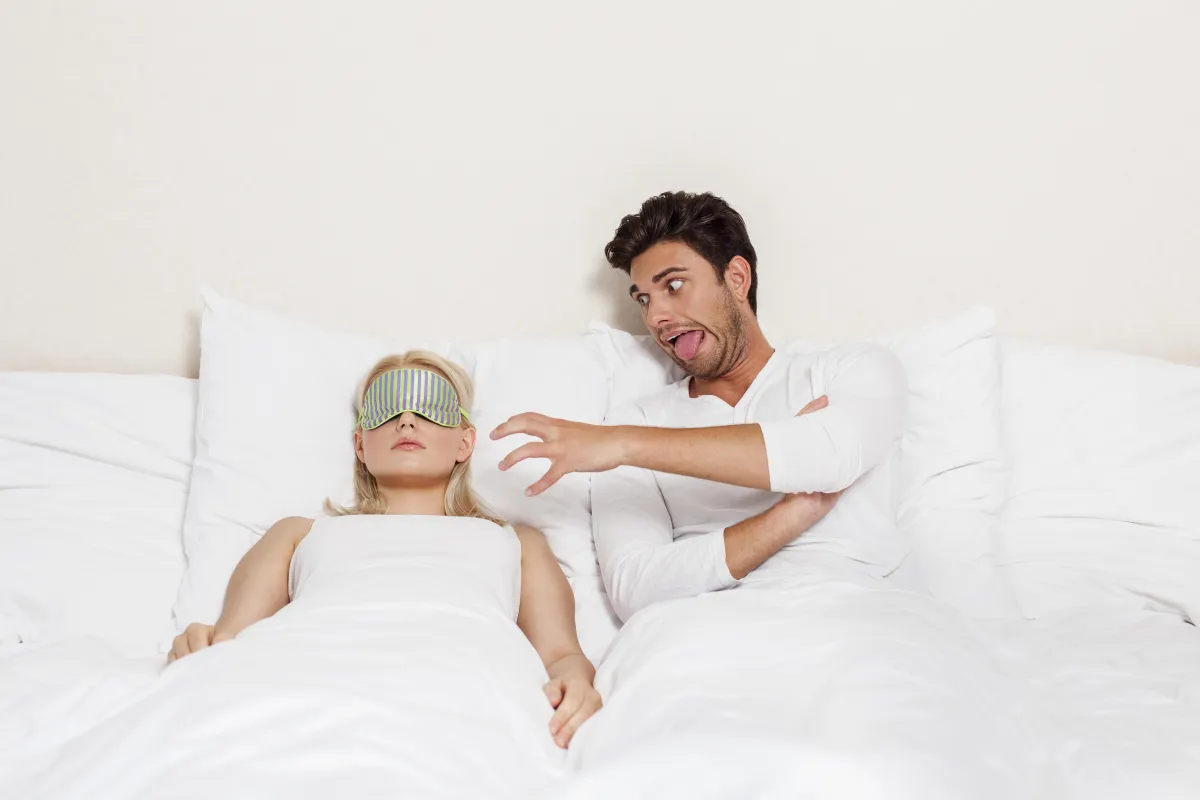
Discover the Top 10 Surprising Reasons Why You're Wide Awake!
Do you find yourself tossing and turning at night, unable to fall asleep? You’re not alone. Many people struggle with getting a good night’s sleep, and there are a variety of reasons why this might be the case. In this article, we’ll explore 10 things that might be keeping you awake and some useful tips to address them.
Some of the links in this post may be affiliate links, you can read my full disclosure here or look for more information at the bottom of this post.
1. Lack of Regular Exercise
One of the most common factors that can keep you awake at night is a lack of regular exercise. If you lead a sedentary lifestyle and don’t engage in physical activities during the day, you may find it difficult to fall asleep at night. Exercise helps to reduce stress and anxiety levels, which are often the main culprits behind insomnia. Make sure to engage in physical activities regularly, even if it’s just a brisk walk or some light stretching.
Tip: If you have a desk job (like I do) then you might want to consider a standing desk. It’s been a game-changer for me. My standing desk has a timer which has been so helpful in reminding me to stand, stretch, or move a bit. There are plenty of standing exercises you can do while you’re working. One of the best exercises while working at a desk is this one.
2. Light exposure
The daylight plays a significant role in our body clock, which is why night shift workers have to pay extra attention to their sleep and wake patterns when they aren’t on the night shift. Our bodies have a built-in clock that reacts to the amount of daylight we get.
Tip: Making sure that you get enough daylight will help to keep your energy levels up during the day, and when the night comes, you will naturally become more sleepy.
There have been several studies into how important daylight is to getting good sleep, and the results support the theory that bright daylight gives a better night’s sleep: Alleviation of sleep maintenance insomnia with timed exposure to bright light.
3. Blue Light
One of the major factors that might be keeping you awake is blue light exposure from electronic devices. Blue light from electronic screens such as smartphones, tablets, and computers can suppress the production of melatonin, a hormone that regulates sleep. This can make it difficult for you to fall asleep and stay asleep.
Tip: To reduce your exposure to blue light, try to limit your use of electronic devices before bedtime. You can also use blue light filters or apps that adjust the color temperature of your screen to reduce the amount of blue light emitted.
When working at my computer, I use glasses with blue light-blocking technology and at night, I have my phone set to limit blue light exposure.
4. Medication
Over-the-counter medicines can also affect your sleep. Some medications, such as pain relievers and allergy medications, contain stimulants that can keep you awake. Here are some examples of over-the-counter medications that can affect sleep:
Pain relievers: Some pain relievers, such as those containing caffeine, can keep you awake.
Decongestants: Decongestants can cause insomnia and other sleep disturbances.
Weight loss supplements: Weight loss supplements often contain stimulants that can interfere with sleep.
Tip: If you’re taking any over-the-counter medications and you’re having trouble sleeping, check the label to see if it contains any stimulants. If it does, try taking the medication earlier in the day so that it has time to wear off before bedtime. If you’re still having trouble sleeping, talk to your doctor or pharmacist. They may be able to recommend a different medication that won’t interfere with your sleep.
5. Room Temperature
The temperature of your bedroom can significantly impact your quality of sleep. If your room is too hot or too cold, it can make it difficult to fall asleep and stay asleep. The ideal temperature for a good night’s sleep is between 60-67°F (15.5-19.5°C).
Tip: To maintain a comfortable temperature, consider investing in a thermostat or a fan. You can also adjust your bedding to match the season. For example, use flannel sheets and a heavier comforter in the winter and switch to lighter bedding in the summer.
6. Noise Levels
Noise is another factor that can disrupt your sleep environment. Loud noises or sudden sounds can wake you up or prevent you from falling asleep. Even if you’re not a light sleeper, ambient noise can still affect the quality of your sleep.
Tip: To reduce noise levels, consider using earplugs or a white noise machine. You can also try using heavy curtains or drapes to block out outside noise. If you live in a noisy area, consider soundproofing your bedroom to create a more peaceful environment.
6. Bedtime Routine
The use of electronic devices before bedtime can also disrupt your bedtime routine and make it harder for you to fall asleep. Checking emails, scrolling through social media, or watching TV can stimulate your brain and keep you awake.
Tip: To improve your bedtime routine, try to establish a relaxing pre-sleep routine that does not involve electronic devices. You can read a book, take a warm bath, or listen to calming music to help you wind down before bedtime.
7. Lack of Supplements
Sometimes our bodies lack the necessary tools to work properly and many have turned to sleep support supplements. When taken in the right dosage at the right time of day, they can help people relax enough to get a restful night. There are many different supplement options on the market, and they come in many forms too.
Tip: If you don’t know where to start, there are some great relaxing teas on the market, capsules, or you can use a combination of the two to make relaxing a lot easier.
8. Your Bedroom
Messy bedrooms can lead to messy minds. There is a direct link between physical clutter and a cluttered mind. So, if you have been putting off cleaning up your bedroom because it just feels like a chore – now might be a good time to get that done.
It’s not just about how tidy it is, though. Start to pay attention to how much light comes through the window and how much noise. Even the furniture arrangement can have an impact on how comfortable you are.
Tip: Blackout curtains and noise blockers can make a huge difference. Also, work on minimizing what you allow in your bedroom. Your bedroom should be an oasis, a place to come to at the end of the day and relax. If it isn’t, here are some tips to make it into the perfect bedroom retreat.
9. Eating and Drinking
If you find yourself struggling to fall asleep at night, it might be worth taking a closer look at your caffeine intake. Caffeine is a stimulant that can interfere with your ability to fall asleep and stay asleep. It’s found in coffee, tea, soda, chocolate, and some medications.
Tips: To reduce the impact of caffeine on your sleep, try to limit your consumption of caffeinated beverages and foods, especially in the afternoon and evening. Opt for decaf coffee or tea instead, and be mindful of hidden sources of caffeine in foods and medications.
Eating late at night can also disrupt your sleep. When you eat a large meal close to bedtime, your body has to work harder to digest the food, which can keep you awake. Additionally, eating spicy or acidic foods can cause heartburn or indigestion, making it difficult to get comfortable enough to fall asleep.
Tip: To avoid these issues, try to eat your last meal of the day at least two to three hours before bedtime. If you do need a snack before bed, choose something light and easy to digest, like a small serving of fruit or a handful of nuts.
10. Stress
Stress and sleep are closely linked. When you are stressed, your body releases hormones that can interfere with your ability to fall asleep and stay asleep. Additionally, stress can cause racing thoughts and worry, making it difficult to quiet your mind enough to fall asleep.
Tip: To manage stress and improve your sleep, it is important to develop healthy coping mechanisms. Some strategies that may be helpful include:
Practicing relaxation techniques such as deep breathing or meditation
Engaging in regular exercise
Maintaining a consistent sleep schedule
Avoiding caffeine and alcohol before bedtime
Creating a relaxing bedtime routine
If it is stress that you are battling, here are some tips that work seasonally and all year round: Relax During the Holidays: Simple Tips to Eliminate Stress.
Remember, getting enough sleep is essential for your physical and mental health. By making changes to your daily habits and addressing any underlying issues, you can improve your sleep quality and wake up feeling refreshed and energized.
Pin this image to Pinterest to reference this article later!
*As an Amazon Associate, I earn from qualifying purchases, but if I am recommending an item in my post, it is only because I have used it myself or have done enough research on the product to feel it is a good fit for my readers.
© 2023 Freedomkit | Powered by Freedomkit.ai

